Thomas E. Ricks's Blog, page 245
June 27, 2011
Petraeus: The troops don't get to quit when they disagree, so why should I?

It was easy to miss this exchange, which near the end of Gen.
Petraeus' confirmation hearing for CIA last week. It is worth reading closely.
GEN.
PETRAEUS: ...So again, I would come back, if I could, Chairman, to my point,
which has to do strictly with the military commander on the ground strictly
evaluating, again, the military campaign plan in awareness of the strategic
context and these other factors that are out there in explicit recognition that
others have to evaluate those factors. I cannot do that. Only the president of
the United States can assess all of the different considerations.
And again,
I should note that I stated this in the situation room to acknowledge that
indeed in this process there are broader concerns than those of the military
commander. And as a result, I obviously support the ultimate decision of the
commander-in-chief -- that is, we take an oath to obey the orders of the
president of the United States and indeed do that.
SEN.
LEVIN: And if you couldn't do that -- if you couldn't do that consistent with
that oath, you would resign?
GEN.
PETRAEUS: Well, I'm not a quitter, Chairman. And I don't -- I think that that -
SEN.
LEVIN: Well, but that's important -- (inaudible).
(Cross
talk.)
GEN. PETRAEUS: I've actually had people e-mail me and say that, and I actually
-- this is something that I have thought a bit about.
SEN.
LEVIN: I'm sure you have.
GEN.
PETRAEUS: And I don't think that it is the place for a commander to -- actually
to consider that kind of step unless you are in a very, very dire situation. This
is a -- this is an important decision. It is, again, a more aggressive approach
than the chairman, General Mattis and I and -- would have indeed certainly put
forward, but this is not something I think where one hangs up the uniform in
protest or something like that.
SEN.
LEVIN: Just the final part of this -
GEN.
PETRAEUS: You know, if I could continue though, Chairman, I feel actually quite
strongly about this. Our troopers don't get to quit, and I don't think that
commanders should contemplate that, again, as any kind of idle kind of action. That
would be an extraordinary action, in my view.
And at the
end of the day, this is not about me, it's not about an individual commander,
it's not about a reputation. This is about our country. and the best step for
our country, with the commander- in-chief having made a decision, is to execute
that decision to the very best of our ability, to do everything I can during
the remainder of my time as commander of ISAF to enable General Allen then to
take the effort forward and then, if confirmed, to be the director of the
Central Intelligence Agency, to do everything I can from that position with
that great organization to support the effort as well.
SEN.
LEVIN: I think that's well put, and it's -- very reflective of your character. You
are a man of extraordinary honor and we all are in your debt.
(HT to TD)
How much will the defense budget be cut over the next decade? Go ahead & guess

10 percent? 25 percent? 50 percent?
We can't know now.
But I think big cuts will be part of any reorganization of the federal budget
down the road, after the debt hits the fan. Plus, the rich are gonna have to
start paying their fair share -- by which I mean at least 75 percent of what
they paid during most of the 20th century, not just on income but, more
importantly, on capital gains.
June 24, 2011
Ah, memories of the Air War College

Space expert Joan Johnson-Freese, now of the Naval
War College (which does a good job on strategy) recalls her five years of
labor down at the minimum security Air War College, which despite my best efforts apparently remains
open. Note she doesn't hurl the infantile word "silly," as might a lesser mind.
Three
instructions in the required "teacher training," for example,
explained the AWC pedagogy. First, never use red ink grading student papers:
direct criticism of military professionals would be insulting. Second, never
cold call a student: not knowing the answer would be demeaning. Third, faculty
were classroom "moderators," not teachers. The classroom was for
sharing student views, so faculty should speak minimally. This last instruction
often resulted in 90-minute sessions where students mostly reinforced each
other's views and exchanged dead-wrong information, but this was equated to
"education." Though never encouraged to publish at the AWC, I was encouraged
to play golf in the afternoon student-faculty team-building tournaments. And
while there were dedicated and productive faculty and exceptional students,
they excelled mostly through personal initiative rather than institutional
support.
(HT to TN)
Rebecca's War Dog of the Week: Life for a British military dog in Afghanistan

By Best Defense Chief Canine Correspondent
Rebecca Frankel
As President Obama made his announcement this week about the troop drawdown this week, allied forces in Afghanistan are on the topic table again. European allies responded positively to the president's announcement. U.K. prime minister David Cameron, who announced his own plan for British troop withdrawals in May, was quick to applaud Obama, adding:
We will keep UK force levels in Afghanistan under constant review. I have already said there will be no UK troops in combat roles in Afghanistan by 2015 and, where conditions on the ground allow, it is right that we bring troops home sooner."
Britain has approximately 10,000 troops on the ground in Afghanistan -- the second highest number after the United States. Working alongside Cornish soldiers on the frontlines out of Camp Bastion -- Britain's largest military base in the country -- are a troop of 70 military dogs. So what's life like for a British military dog in Afghanistan? Actually, not too shabby.[[BREAK]]
The accomodations for these war dogs (as seen in this BBC video) are extensive. Each dog has his or her own kennel quarters -- a small square building with both an indoor and outdoor component. The indoor quarters are air conditioned and each kennel has its own self-sustaining power source.
While on patrol, each handler is outfitted with a special canine first aid kit. For the detection and patrol dogs in Afghanistan, heat is always the handlers' and veterinary medics' biggest concern. There's also only one pool on base -- and it's just for the dogs.
But the canines aren't the only ones happy with these arrangements:
Private Daniel Gregory, from Bodmin, helps look after the dogs at Camp Bastion [says]: 'It's the love of the dogs, working outside everyday. It's a good job, a really good job.'
In the photo above, British Army soldier Lcpl Marianne Hay from the Royal Army Veterinary Corp, crouches next to her explosives dog Leanna on Aug. 3, 2008 in Maywand District in Kandahar Province, Afghanistan.
Here's another good reason to heed Jim Gourley's advice about Army PT

A response to his
comment was made on this blog. Best part: "I'll tell you this, though. The Army
end strength is going to go down very shortly. Fatboys are gonna be the low
hanging fruit that gets picked when it comes time
to separate people."
Meanwhile, a young lieutenant writes from a faraway land
that he has been surprised at how unfit many soldiers are, even in the combat
arms:
For the most part
the Army is far more overrated as far as physical standards than what we were
told during ROTC. I am considered a PT stud and def wasn't that in ROTC. The
Army needs to cut the fatties out anyways which make up about 1/4 of all
soldiers. Some look like bloated pigs. Whenever I take command one of my first
things I will do is go on a Company run at an average pace, nothing special . .
. and tell the 1SG that all the people that fell out of the run at any point
will be on special PT profile doing PT in the afternoons. This includes all
leadership. The key is that no one will know that this will happen until after
the run. They will get the point real quick.
Blog comment of the day: Here's how the Army screwed up its museum situation
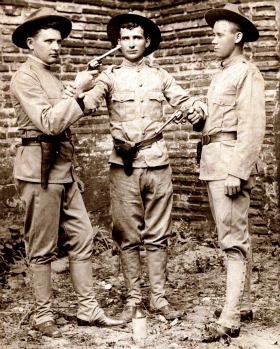
From a suspiciously well-informed "Unicorn":
Some
facts:
First
the Army doesn't actually own enough in the way of museum worthy artifacts to
fill a central museum even if one were to be built. Most of the nation's
preserved history at arms was accomplished by the far larger militia in whose
states that history was and is preserved (see for examples the Ohio Historical
Society or the New York 69th ).
With
the exception of the West Point teaching museum (on the old Ladycliff campus)
the central Army and its general staff actually have very little in the way of
artifacts. What does exist in the 1/3 of the Army that is active is: a) mostly
WWII or after and that b) firmly in the hands of fort, camp and station museums
that are 501 C3 outfits which have been in existence for years and have become
part of the local communities' tourism base, as well as touchstones to unit
identity (see for example the Airborne Museum). Over the decades of dreaming of
a super army central museum there have been more than a few attempts by the
Army general staff to gather "their" collection by demanding those "local"
collections be made available for the to be built central facility. The
reactions were predictable: "hell no" is a fair summary of those responses.
What
the active Army does have is a large collection of art, mostly bad, all WWII
and some after (including a vast store of really, really bad Nazi art ironically
preserved aside Norman Rockwell pieces) that never sees the light of day. They
are so protective of it that whenever a senior general or civilian asks for
some to decorate their offices, it is supplied, but as a very expensive on
cardboard fake (see the portraits of the former Army Secretaries and Chiefs of
Staff in the Pentagon - all are on card board fakes - the real "art" is in
secure storage. The explanation for this is to prevent any of it being harmed
should the Pentagon be attacked again. In case you were wondering, it is all
housed in a high rise and high rent building in downtown DC just off of K
Street. Go figure.
Second,
the history of the many aborted sites for this central museum could be a novel
in itself. In spite of a wealth of evidence that large scale museums only
thrive (generating visitor traffic sufficient to cover the huge cost of a big
central facility) when they are near other tourist attractions, making them
part of a "destination experience" (see Disneyland), the Army has always tried
to find out of the way places far from other things. This is best exemplified
by the location of the moment - in the middle of Ft Belvoir, a place where even
the local county commissioners say there is so much traffic it is impossible to
get to, and there is zero else to do nearby making it a most UNdestination
experience for tourists.
The previously aborted sites (the Mall, the Marriot Twin Bridges etc) each have
their own sad tales; the current location was selected after the Army declined
the opportunity to obtain for ONE DOLLAR the southern half of the Washington
Navy Yard (then empty). Completely build out ready, this huge site had acres of
land to build on, to parade, river front access for ducks etc, located adjacent
the Navy's National Museum, close to two interstate highways, a Metro stop at
the front door, the Capital barely 5,000 feet away, etc, etc. In short, this
was a museum location of unbelievable potential. Instead the Army general staff
convinced Louis Caldera and his Chief to trade that site for something at
Belvoir (with John Warner in exchange his support) for several Stryker brigades
that the Army was going to get anyway. You can't make this stuff up.
Unicorn
out
June 23, 2011
The presidential Afghanistan speech I was promised vs. the speech I actually heard
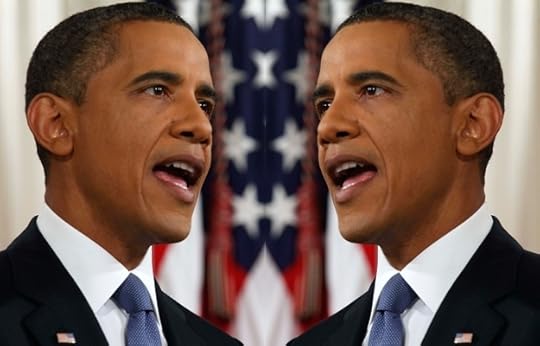
By Nora Bensahel
Best Defense bureau of presidential speech analysis
Late Wednesday afternoon, I headed over to the White House to attend a background session about President Obama's Afghanistan speech. But when I watched the speech a few hours later, I wondered if I had somehow had wandered into the wrong briefing room.
I was promised by senior administration officials that the speech would provide at least some strategic rationale for withdrawing 10,000 U.S. troops by the end of 2011 and 23,000 more troops by September 2012. They argued that the concept of a distinct fighting season is not entirely right, and so withdrawing forces next summer would not affect military operations significantly. They argued that the timing of the withdrawal was determined primarily by U.S. rotational requirements, that the mission will remain unchanged, and that General John Allen (who could replace General Petraeus as early as next month) will be have complete flexibility to determine how and where the remaining 68,000 troops will be used. And they emphasized that the U.S. government is committed to establishing an enduring strategic partnership with Afghanistan after 2014 that would likely include a U.S. military presence in addition to civilian assistance.
I was not convinced by many of these arguments. Strategic objectives should drive withdrawal timetables and not rotational requirements. These officials underestimate the risks that this timetable poses for military operations, and should openly acknowledge that the mission will inevitably change away from counterinsurgency towards counterterrorism. Still, at least these are arguments that can be debated.
The speech I heard Wednesday night, however, was a political speech that addressed none of these issues. By my count, only a third of an already-short speech discussed the future U.S. role in Afghanistan, and it provided no strategic rationale. Instead, its overwhelming message was that the war in Afghanistan is basically over and that the United States is simply winding down an already successful mission. The last half of his speech mentioned Libya, the Arab Spring, clean energy, and "nation building here at home" - the clearest possible signal that Afghanistan is no longer a policy priority.
This may be an appealing message for the majority of Americans who believe that U.S. troops should be withdrawn as quickly as possible. But it does not explain why 68,000 U.S. troops will remain in Afghanistan after next September or why the United States would benefit from a long-term strategic partnership. Instead, it builds unrealistic expectations that the war in Afghanistan is on a stable path towards success - and those expectations will be soon be shattered by the casualties that will inevitably occur as military operations continue.
Many Americans may be happy with the speech I heard. But they really needed to hear the speech I was promised.
Nora Bensahel
is a senior fellow and deputy director of studies at CNAS.
Obama does Lincoln: Why doesn't he just grow a beard and buy a top hat?
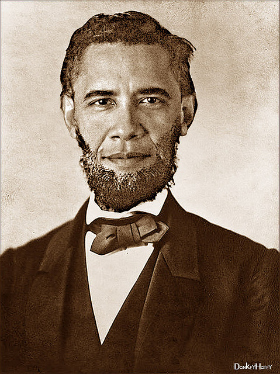
What struck me most
about the president's speech is not that he plans to cut the American presence
in Afghanistan but that he committed us to staying there for several more
years.
And again,
the Lincolnesque rhetoric.
Obama last night:
"Now, let us
finish the work at hand. Let us responsibly end these wars, and reclaim the
American Dream that is at the center of our story. With confidence in our
cause; with faith in our fellow citizens; and with hope in our hearts, let us
go about the work of extending the promise of America -- for this generation,
and the next."
"With malice toward none, with charity for all, with
firmness in the right as God gives us to see the right, let us strive on to
finish the work we are in, to bind up the nation's wounds, to care for him who
shall have borne the battle and for his widow and his orphan, to do all which
may achieve and cherish a just and lasting peace among ourselves and with all
nations."
(HT to RF)
Hard times looming for Iraq's Kurds
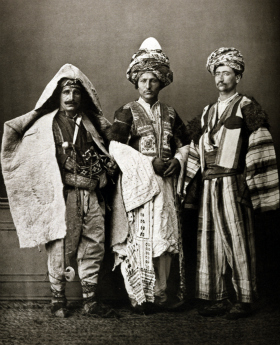
By Sarah Reinheimer
Best Defense office
of Kurdish affairs
The United States has
long counted on Iraq's Kurds
to be a relatively stable political partner in a volatile country. Yet after months
of pro-democracy demonstrations that triggered violent
crackdowns and media
suppression by the Kurdistan Regional Government, the United States
government needs to keep a much closer eye on the Kurdish region to ensure that
simmering problems there do not boil over, according to a June 15 session
at the Washington Institute for Near East Policy.
One of Iraqi
Kurdistan's worst problems is its weak economy. As WINEP's Michael Eisenstadt
explained, "The Iraqi Kurds believe that their economic situation will continue
to improve" as it becomes more urban, but in reality its economy "suffers from
structural shortcomings." Due to the lack of jobs, the government pays students
to go to night school so they have something to occupy their time. Even more troubling,
out of 5 million citizens, half are children and 1.3 million are employed by
the government. Many Iraqi Kurds are unwilling to do menial tasks, and the
government and industries are forced to import foreign workers to do jobs
normally reserved for citizens.
This patronage
system "hinders the Kurdistan population from reaching its potential," warned
Eisenstadt, and will only worsen as the Iraqi Kurds become more dependent on
foreign workers. Nevertheless, the economic situation is "viewed as not so bad"
by Iraqi Kurds, a startling complacency given the scope of the challenges.
What truly worries
the Iraqi Kurds and could bring the most instability to the country is the
coming departure of U.S. troops. The Iraqi Kurds feel surrounded on all sides
by unfriendly neighbors, despite the economic and political partnership they
have developed in recent years with Turkey, a country that continues to
disenfranchise its own large Kurdish population. Baghdad and Arbil share no
intelligence, and Iraqi Kurds worry that as soon as most U.S. troops leave,
Baghdad will turn on the Kurds, just as it did during Saddam's reign, with the
weapons and training the United States has provided.
Given these
difficulties, the United States needs to re-evaluate its policy towards Iraqi
Kurdistan. The United States, as WINEP's Michael Knights advocates, should
encourage intelligence sharing between Baghdad and Arbil while maintaining some
form of U.S. military observation mission in Arbil to monitor Kurdish security.
While Iraq is one country, the distrust between the Kurds and the central
government in Baghdad, coupled with Kurdistan's dysfunctional economy, could
further destabilize the country in the months ahead.
Army War College substance abuse advisor busted on cocaine charges
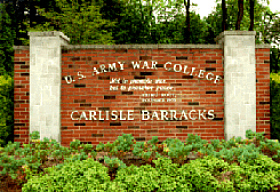
[Insert
here a lame joke about finally understanding certain TRADOC papers.]
Actually,
the bust
is not as wacko as it seems. From what I've seen, many people working in drug
and alcohol abuse are people who have experienced problems themselves, and some
of them do have relapses. So, ironic but not funny. (HT to http://court-martial-ucmj.com/)
Thomas E. Ricks's Blog
- Thomas E. Ricks's profile
- 437 followers



